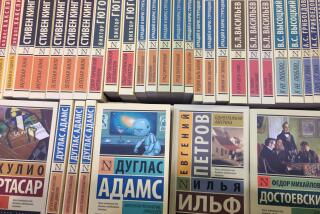Tidal Wave of Emigration Carries Off Soviet ‘Brains’ : Exodus: Experts say the trend threatens Kremlin reforms and could set back scientific research.
- Share via
MOSCOW — Just when the country needs them most, tens of thousands of the Soviet Union’s best minds are streaming to the West in what officials describe as a brain drain so massive that it could jeopardize the Kremlin’s reforms.
The current tidal wave of emigration, expected to total more than half a million this year, is carrying off the very people needed to rebuild the nation, according to Soviet authorities, who say that the exodus could also set back their country’s scientific research for decades.
“In the next 10 years, up to 7 million people may leave, among them hundreds of thousands of specialists,” Vladimir M. Petrov, head of the Communist Party’s ideology section, told a round-table discussion on emigration sponsored by the newspaper Rabochaya Tribuna. “We should realize that this threatens us with loss of superiority in a number of fields. Mass emigration will hurt the vital interests of the country.”
The State Committee on Education as well as Soviet emigration authorities have projected that 1.5 million of the most qualified of the country’s 15 million scientists and technical specialists could leave over the next decade, according to Felix I. Peregudov, the committee’s deputy chairman.
“One and a half million--that’s exactly the stratum of the intellectual elite that is in such a catastrophic shortage now,” Peregudov said. “I don’t believe at all in the success of perestroika if professionals don’t come to the helm everywhere. We have to hold onto them, no matter what.”
Faintly audible behind such calls is nostalgia for the old days when repressive authorities could simply keep citizens locked in the country by denying them permission to leave.
Now, with a new emigration law expected to pass soon and virtually throw open the Soviet Union’s exit gates, the government can only try to tempt scientists, technicians and managers into staying by raising their miserly salaries and promising better conditions--eventually.
For Jews frightened by anti-Semitism and Armenians who have seen their brethren killed in bloody pogroms; for scientists stymied by primitive equipment and parents worried about their children’s future, that is not much of an incentive.
“I’m just very afraid for myself and my family,” Vladimir Rozansky, 51, a Jewish specialist in control systems, said as he waited in a small crowd outside the U.S. Embassy for his visa. “Everything here is so unstable.”
Mikhail Grinfeld, a physicist-mathematician who holds a prestigious doctor of science degree, said that he would have preferred to work just a year or two in the United States but that his wife insisted on emigration for the sake of their two sons.
“I didn’t want to leave, and I still don’t want to leave,” Grinfeld said. “But no one knows what will be happening here very soon.
“A lot of my colleagues are leaving,” he added. “They don’t like the uncertainty of the situation.”
The outflow of Soviet talent--an estimated 20% of emigrants hold advanced or professional degrees--has become so noticeable that President Mikhail S. Gorbachev himself has complained about it.
“A colossal hunt is already going on, by America, for our mathematicians, our technicians and programmers. A hunt! A hunt!” Gorbachev told a Communist Party meeting earlier this year. “That’s what America does: It spares no expense, it buys people up throughout the world.”
Gorbachev argued that Soviet scientists should receive substantial raises and better working and living conditions to encourage them to stay home.
Peregudov said the main problem lies not in numbers but in quality.
“Who can bring the country out of its deep crisis?” he asked. “Only professionals, and we, unfortunately, have extremely few of them. At any enterprise that demands a mind, everything depends on two or three dozen people. And, alas, they are the ones who are trying to leave, hoping for good work and salary. Yes, yes, those who know their own worth.”
If the outflow continues, officials at the Rabochaya Tribuna round table warned, the Soviet Union could turn into an “intellectual desert.”
Victor I. Martsinkevich, a senior researcher on human resources at the Institute of World Economics and International Relations, put his fears differently. Sometimes, he said, he thinks about “genetic deterioration. I think all is not lost, but I don’t know.”
Time and again in this century, the cream of this country’s intelligentsia has been lost. Much of the Russian nobility and priesthood emigrated or was killed during the Bolshevik Revolution and the civil warfare that followed. Millions more, including many brilliant writers and scientists, were slaughtered under dictator Josef Stalin.
Then World War II claimed at least 27 million Soviet lives and unleashed a second major wave of emigration. And in the 1970s and early 1980s, tens of thousands of Jews left for Israel and the United States.
The Jews and political dissidents who left in the third wave were branded “traitors to the motherland” and often suffered harassment and humiliation.
The tone taken to discuss this fourth wave, despite the negative sound of the phrase “brain drain,” is different, regretful instead of vindictive, with none of the “good riddance” spite of old.
The liberal newspaper Moscow News headlined a front-page feature on emigration, “The Country Can’t Do Without Them,” and Rabochaya Tribuna subtitled the report on its round-table discussion: “What the fourth wave of emigration is taking away with it.”
Vladimir Pozner, a Soviet commentator who often addresses American audiences and now has a Sunday night talk show on Soviet television, devoted a program to the brain drain that turned into a condemnation of the collapsing, repressive system that leads people to leave--rather than of the emigres themselves.
“They’re seeking freedom. Good for them. Long live freedom!” eye surgeon and entrepreneur Svyatoslav Fyodorov proclaimed to Pozner’s studio audience.
One prominent professor, Galina Belaya, even complained in the youth newspaper Moskovsky Komsomolets that the term “brain drain” should not be used because it is insulting to those leaving.
“I’m just surprised that Parliament doesn’t appeal to these people, doesn’t stop them, comfort them and say: ‘Where are you going? This home is still your home!’ ” Belaya said. “But when people start expressing regret about a brain drain, when I read that in newspapers or hear it on television, I burn with shame.
“What is this--are slaves and robots leaving? Or people, who have gone through all the wars and revolutions with Russia, their own country?”
Unable, given the country’s growing democratization, to use old-style crackdowns to stop the outflow of minds, the Soviet government is thus raising salaries and trying to improve working conditions to persuade citizens to stay.
Scientific workers have traditionally earned less than the average monthly salary, which now runs about 240 rubles--either about $380 or $38, depending on whether the commercial or tourist exchange rate is used.
But caught in a deepening economic crisis and suffering the consequences of decades of mismanagement, the Soviet government cannot begin to afford to compete with Western salary scales, high-class equipment and standards of living.
Martsinkevich said scientific institutes and industries have been unpardonably slow to take other measures that could stem the flow, including increasing rewards for inventors and opening the way for young talent to move ahead.
“They understand, but they’re sort of pig-iron institutions, and their steps are irresolute,” he said. “Maybe Gorbachev and (Prime Minister Nikolai I.) Ryzhkov understand too, but they are overwhelmed by so many other problems.”
With little likelihood of blocking the intellectual exodus, Soviet authorities are left with no choice but to make the best of it.
“It is clear that bans, quotas and limits will not work,” the newspaper Pravitelstvenny Vestnik said. “Such measures are unpopular. Seriously speaking, today it is impossible to offer anything to offset the seductions of leaving to work ‘out there.’ ”
Martsinkevich said that the brain drain does not worry him because the Soviet system in science and many other fields is so inefficient, so ridden with poor quality and over-staffing, that all the country needs to do to compensate for those leaving is to make better use of the people who remain.
“The idea is not to hold onto people and not let them out; it’s to activate the people here,” he said.
Martsinkevich added with satisfaction that the brain drain shows that the Soviet Union is finally integrating itself into the world labor market and that ultimately Soviet science and technology can only benefit.
Grinfeld, the emigrating mathematician, predicted that although Soviet science may lose out over the next 20 years, it will come out ahead over the next 50.
“And world science wins out, that’s the main thing,” he said.
With mass emigration a given, Martsinkevich and others say, the key now is to help those emigres who change their minds and wish to come back and to develop warmer ties with Russian communities abroad.
Under current law, emigres lose their Soviet citizenship on departure and are allowed to export only a minuscule portion of their belongings and savings when they go.
Suggestions to encourage returnees include allowing emigrants to keep their apartments in the Soviet Union and even giving them grants when they come back to help them get set up again. About 800 emigrants returned last year, according to Soviet officials.
Martsinkevich also said that Soviet authorities are “watching jealously” to see what the U.S. Congress will decide about continued Soviet immigration. American Embassy officials estimate that they have received 1.5 million immigration applications from Soviet citizens, and about 70,000 will be allowed to enter this year.
Martsinkevich predicted that it will cause friction if America tries to “artificially stimulate” the emigration of talented specialists, presumably through allotting them special quotas and funds.
According to Soviet estimates, the United States has drawn at least half its supply of mathematicians from the Soviet Union over the last two decades.
The effect of the brain drain goes beyond the holes left in laboratories and institutes. Some say that all of Soviet science and other industries have grown increasingly demoralized as many of their best people leave.
“The scientific climate is different now,” Grinfeld said. “When high-level scientists meet now for seminars, we mainly discuss who’s going where.”
BACKGROUND
The Soviet Union is not the first nation to suffer a “brain drain.” Indeed, one has been going on since the end of World War II, notably from Europe--Britain has complained of it bitterly for years. Israel, too, has seen its best minds siphoned off. Now, the complaint comes from around the world: Hong Kong, with the threat of Chinese sovereignty looming in 1997, expects to lose 55,000 of its best and brightest this year after 42,000 emigrated last year. Lee Kuan Yew, prime minister of economically bustling Singapore, appeared on television with tears in his eyes not too long ago to warn of the problem there. Nor has Latin America escaped: Reports of “brain drain” echo from Mexico to Argentina, and even the West Indies’ Trinidad and Tobago is not immune. And the goal of this intellectual wave? Traditionally, the United States.
More to Read
Sign up for Essential California
The most important California stories and recommendations in your inbox every morning.
You may occasionally receive promotional content from the Los Angeles Times.










